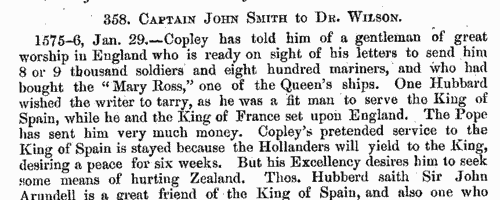Our indexes include entries for the spelling raven. In the period you have requested, we have the following 623 records (displaying 31 to 40):
Tenants, founders and incumbents of Yorkshire chantries
(1546-1548)
Chantries were established to perform services for the souls of their founders and other faithful dead, including annual obits and anniversaries at which alms were usually distributed. The chantries could be at an existing altar in a parish church, a new altar in a side chapel of an existing church, in a new chapel in the churchyard or some miles from an existing church: few were founded before 1300, and most date from 1450 to 1500. Hospitals were places provided by similar foundations to receive the poor and weak; there were also religious guilds, brotherhoods and fraternities, and colleges (like large chantries at which three or more secular priests lived in common). An Act of Parliament of 1545 gave king Henry VIII the power to dissolve such chantries, chapels, &c., the proceeds to be devoted to the expenses of the wars in France and Scotland. Commissioners were appointed 14 February 1546 to survey the chantries and seize their property, and from 1546 to 1548 the commissioners produced these certificates giving brief details of the establishment and nature of each foundation, with an inventory of valuables and rental of lands. The individuals named in the certificates are thus the founder, the present incumbent, and the tenants whose rents provided the chantry's income. All the surviving certificates were edited by William Page for the Surtees Society, and published from 1892. | Sample scan, click to enlarge

|
Tradesmen of York
(1272-1558)
No man or woman could trade in the city of York without having obtained 'freedom' of the city.Their names were recorded on the 'Freemen's Roll', or Register of the Freemen of the City of York, which contains about 19,900 names for this period. A list of names was prepared for each year, the year being here reckoned as starting at Michaelmas (29 September) until 1373, and thence at Candlemas (2 February). Each annual list starts with the name of the mayor and the camerarii or chamberlains. The chamberlains were freemen charged with the duty of receiving the fees of the new freemen; of seeing that only freemen traded in the city; and of preparing this roll, which was compiled from the names on their own account books from the receipts for the fees. There are three groups of freemen: those who obtained freedom after serving out an apprenticeship to a freeman; the children of freemen; and those who claimed freedom by 'redemption', i. e. by purchase or gift from the Mayor and Court of Aldermen.
| Sample scan, click to enlarge

|
Liegemen and Traitors, Pirates and Spies
(1556-1558)
The Privy Council of king Philip and queen Mary was responsible for internal security in England and Wales, and dealt with all manner of special and urgent matters
| Sample scan, click to enlarge

|
Liegemen and Traitors, Pirates and Spies
(1571-1575)
The Privy Council of queen Elizabeth was responsible for internal security in England and Wales, and dealt with all manner of special and urgent matters
| Sample scan, click to enlarge

|
Cecil Manuscripts
(1572-1582)
Letters and papers of William Cecil lord Burghley, Lord Treasurer. Includes some other material as early as 1553. | Sample scan, click to enlarge

|
Liegemen and Traitors, Pirates and Spies
(1587-1588)
The Privy Council of queen Elizabeth was responsible for internal security in England and Wales, and dealt with all manner of special and urgent matters
| Sample scan, click to enlarge

|
Anglo-Scottish relations
(1509-1589)
The State Papers Relating to Scotland is the collection of English government documents dealing with relations with Scotland when the latter was still an independent country.
| Sample scan, click to enlarge

|
Cecil Manuscripts
(1583-1589)
Letters and papers of William Cecil lord Burghley, Lord Treasurer of England. | Sample scan, click to enlarge

|
Funeral Certificates: Witnesses and Mourners (1595)
Funeral certificates, issued by heralds of the College of Arms for the obsequies of the armigerous, gave date and place of death, and brief genealogical details.
| Sample scan, click to enlarge

|
Worcestershire Quarter Sessions
(1598)
J W Willis Bund compiled this abstract of surviving records from the Worcestershire quarter session rolls for the Records and Charities Committee of the Worcestershire County Council. This text, extending as far as 1621, was published in 1899: the entries are arranged by year under the headings Recognizances, Indictments, and Miscellaneous. | Sample scan, click to enlarge

|
Research your ancestry, family history, genealogy and one-name study by direct access to original records and archives indexed by surname.











